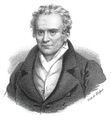Template:Selected anniversaries/July 28: Difference between revisions
No edit summary |
No edit summary |
||
| Line 13: | Line 13: | ||
||1887 – Marcel Duchamp, French-American painter and sculptor (d. 1968) | ||1887 – Marcel Duchamp, French-American painter and sculptor (d. 1968) | ||
||1902 | File:Karl Popper.jpg|link=Karl Popper (nonfiction)|1902: Philosopher and academic [[Karl Popper (nonfiction)|Karl Popper]] born. He will be known for his rejection of the classical inductivist views on the scientific method, in favor of empirical falsification: A theory in the empirical sciences can never be proven, but it can be falsified, meaning that it can and should be scrutinized by decisive experiments. | ||
||Arthur Sard (b. 28 July 1909) was an American mathematician, famous for his work in differential topology and in spline interpolation. His fame stems primarily from Sard's theorem, which says that the set of critical values of a differential function which has sufficiently many derivatives has measure zero. | ||Arthur Sard (b. 28 July 1909) was an American mathematician, famous for his work in differential topology and in spline interpolation. His fame stems primarily from Sard's theorem, which says that the set of critical values of a differential function which has sufficiently many derivatives has measure zero. | ||
Revision as of 16:32, 1 December 2017
1818: Mathematician and engineer Gaspard Monge dies. He invented descriptive geometry, and did pioneering work in differential geometry.
1902: Philosopher and academic Karl Popper born. He will be known for his rejection of the classical inductivist views on the scientific method, in favor of empirical falsification: A theory in the empirical sciences can never be proven, but it can be falsified, meaning that it can and should be scrutinized by decisive experiments.
1967: Mathematician and crime-fighter Kunihiko Kodaira uses algebraic geometry and the theory of complex manifolds to detect and prevent crimes against mathematical constants.
1968: Chemist and academic Otto Hahn dies. He pioneered the fields of radioactivity and radiochemistry, winning the Nobel Prize in Chemistry in 1944 for the discovery and the radiochemical proof of nuclear fission.
1974: Watergate scandal: The House of Representatives Judiciary Committee votes 27 to 11 to recommend the first article of impeachment (for obstruction of justice) against President Richard Nixon.
1974: Industrialist, public motivational speaker, and alleged crime boss Baron Zersetzung says he "advised President Nixon to have one of the House Judiciary Committee members murdered, as a lesson to the others."





